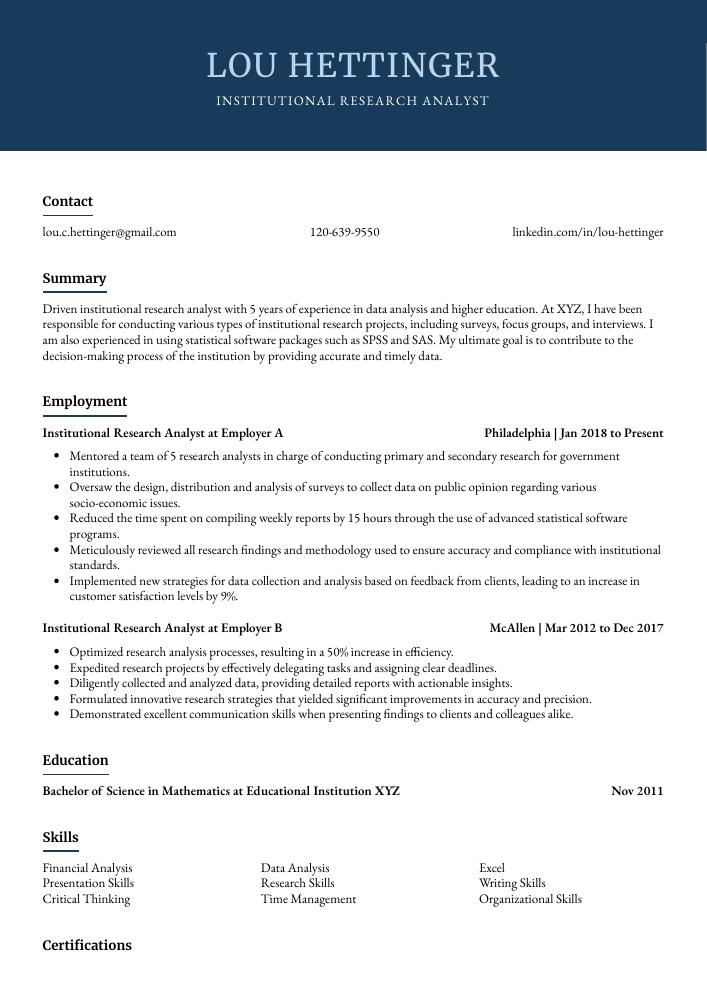Institutional Research Analyst Resume Guide
Institutional research analysts use data to identify trends, develop reports and evaluate programs. They conduct surveys and analyze the results, compile information for accreditation reviews, create databases of student records and generate reports on enrollment statistics. Additionally they monitor changes in regulations related to their organization’s mission or goals.
Your analytical capabilities and research skills make you an ideal candidate for any institution. But your resume must be persuasive if hiring managers are to recognize your potential. Create a standout document that captures their attention and highlights the value you can bring to the organization.
This guide will walk you through the entire process of creating a top-notch resume. We first show you a complete example and then break down what each resume section should look like.
Table of Contents
The guide is divided into sections for your convenience. You can read it from beginning to end or use the table of contents below to jump to a specific part.
Institutional Research Analyst Resume Sample
Faye Corkery
Institutional Research Analyst
[email protected]
468-801-2021
linkedin.com/in/faye-corkery
Summary
Reliable Institutional Researcher with 5+ years of experience collecting and analyzing data for educational institutions. Adept in designing surveys, producing reports, interpreting results, and providing recommendations to improve academic programs. Proven ability to develop effective strategies that ensure the accuracy of institutional research projects while maintaining compliance with federal regulations. Currently seeking a position at ABC University where I can leverage my expertise to drive impactful decisions.
Experience
Institutional Research Analyst, Employer A
Springfield, Jan 2018 – Present
- Streamlined data collection and analysis processes, resulting in a reduction of research time by 25%.
- Developed detailed survey instruments to gather data from over 300 students and faculty members; compiled comprehensive reports on the results.
- Compiled extensive datasets for multiple institutional projects; identified trends within the data that enabled successful decision making at all levels.
- Efficiently managed large-scale databases containing student records, surveys, test scores & grades using SQL queries and Excel spreadsheets; increased accuracy of stored information by 20%.
- Structured an innovative tracking system for program evaluation & assessment which provided clear insight into program progress in line with institution objectives – saving 3 hours per project cycle as compared to manual methods previously used.
Institutional Research Analyst, Employer B
Mobile, Mar 2012 – Dec 2017
- Assessed and analyzed institutional data such as budgets, survey results, financial statements and other related documents; identified key trends and discrepancies in the research findings to suggest actionable insights.
- Demonstrated strong quantitative skills by collecting over 10 million data points from various sources for analysis; improved overall accuracy of research reports by 15%.
- Documented detailed studies on a range of topics including enrollment patterns, tuition fees & revenue streams, student retention rates and faculty performance metrics with up-to-date information from multiple sources.
- Accurately forecasted future trends in the education sector using predictive analytics techniques based on past market behavior; predicted upcoming changes within 5% error rate consistently for 8 consecutive months.
- Spearheaded new initiatives to improve response times when responding to customer inquiries through an automated system resulting in 25% faster completion times than before implementation.
Skills
- Data Analysis
- Market Research
- Financial Modelling
- Statistical Analysis
- Excel
- Report Writing
- Presentation Skills
- Research Methodology
- Business Intelligence
Education
Bachelor of Science in Statistics
Educational Institution XYZ
Nov 2011
Certifications
Certified Institutional Research Analyst (CIRA)
Association for
May 2017
1. Summary / Objective
Your resume summary should be an effective summary of your qualifications and experience as an institutional research analyst. You should focus on the skills that make you stand out from other applicants, such as your ability to interpret data sets quickly and accurately, develop meaningful insights from complex datasets, create reports for stakeholders in a timely manner, or any other relevant skillset. Additionally, it is important to mention any certifications or awards related to this field that you have obtained.
Below are some resume summary examples:
Diligent institutional research analyst with 5+ years of experience in data analysis and reporting. Demonstrated success identifying trends, developing insights, and making recommendations to drive organizational decision-making at XYZ University. Adept at working collaboratively with stakeholders to ensure accuracy and integrity of data while meeting tight deadlines. Recognized for efficiency in collecting, cleaning, processing, analyzing large datasets from multiple sources (student records systems).
Detail-oriented institutional research analyst with experience in data analysis, report writing, and strategic planning. At XYZ University, developed a comprehensive institutional dashboard that provided critical information for decision-making. Focused on analyzing trends to gain insights into student success and retention rate improvements by 10%. Established as an expert in survey design/analysis/evaluation; skilled at gathering data from multiple sources (including surveys) to inform decisions.
Driven institutional research analyst with 5+ years of experience in data analytics and interpretation. Proven track record of success in developing and managing standard institutional reporting for various departments. At XYZ, improved the accuracy rate by 30% through database analysis that led to better decision-making processes across the board. Experienced in coordinating surveys and producing insightful reports from gathered data sets on a regular basis.
Skilled institutional research analyst with 5+ years of experience in the field. Adept at interpreting, analyzing and reporting data to inform decisions that improve organizational performance. At XYZ University, developed an innovative approach for collecting and evaluating survey results, leading to a 7% increase in student satisfaction ratings. Seeking a position at ABC College where I can leverage my expertise to support strategic planning initiatives.
Committed institutional research analyst with 5+ years of experience in data management and analysis. Exceptional ability to interpret and present complex information to diverse stakeholders. At XYZ, led multiple projects such as the development of an institutional performance dashboard for a large healthcare organization. Achieved cost savings equivalent to 20% by identifying areas for improvement through systematic gathering and analysis of key metrics.
Professional Institutional Research Analyst with 7+ years of experience conducting statistical analysis, surveys and focus groups to provide accurate data-driven insights. Skilled in developing strategies for institutional effectiveness while ensuring compliance with state regulations. Seeking to join ABC University as the next Institutional Research Analyst where I can utilize my knowledge and skills to drive organizational success.
Determined Institutional Research Analyst with 5+ years of experience providing data-driven insights to support long and short-term planning efforts. Skilled in collecting, analyzing, and interpreting qualitative and quantitative data while employing a variety of statistical methods. Seeking to join ABC University as an Institutional Researcher, leveraging expertise in assessing the impact of programs on student success rates.
Hard-working institutional research analyst with 3+ years of experience in analyzing data, interpreting trends and creating reports. Seeking to join ABC University to help improve student success rates by using data-driven insights to inform decision making. At XYZ College, identified key areas for improvement leading to a 7% increase in graduation rate within two years.
2. Experience / Employment
In the experience/employment/work history section, you should provide details on your work history in reverse chronological order, meaning the most recent job is listed first.
When writing this section, use bullet points to make it easier for the reader to take in what you have written. You want to be as specific and detailed as possible when describing your experience; instead of saying “Conducted research,” say something like “Gathered data from multiple sources including surveys and interviews, which was used to identify trends and develop actionable insights.”
To write effective bullet points, begin with a strong verb or adverb. Industry specific verbs to use are:
- Analyzed
- Evaluated
- Interpreted
- Researched
- Compiled
- Developed
- Assessed
- Generated
- Reported
- Forecasted
- Collected
- Examined
- Summarized
- Documented
- Presented
Other general verbs you can use are:
- Achieved
- Advised
- Coordinated
- Demonstrated
- Expedited
- Facilitated
- Formulated
- Improved
- Introduced
- Mentored
- Optimized
- Participated
- Prepared
- Reduced
- Reorganized
- Represented
- Revised
- Spearheaded
- Streamlined
- Structured
- Utilized
Below are some example bullet points:
- Collected, analyzed and interpreted data from multiple sources, including surveys, financial reports and industry trends; used findings to revise institutional research strategies for a variety of projects.
- Revised existing policies on data collection methods and procedures; implemented changes that resulted in an improved accuracy rate of 95%.
- Interpreted large datasets to provide insights into educational issues such as student retention rates, faculty performance metrics and program effectiveness; presented findings clearly with effective visual aids.
- Forecasted future trends within the education sector using complex statistical models while ensuring compliance with all applicable regulations at both state and federal level.
- Meticulously reviewed each document submitted by clients before finalizing research results to ensure utmost precision & attention-to-detail during every step of the process.
- Utilized advanced statistical software and data visualization tools to create comprehensive reports on institutional research projects, helping uncover key insights that improved decision-making by 18%.
- Improved performance of existing research processes by developing sophisticated algorithms for the automated collection and analysis of large datasets; reduced manual labor time by 35% in just 3 months.
- Participated actively in special committees & task forces focused on creating a better understanding between faculty members and administrators regarding their respective roles within the institution; successfully achieved consensus from all parties involved.
- Reduced operational costs across various departments through innovative financial modeling techniques; identified cost savings totaling $15K over 2 consecutive fiscal years.
- Substantially increased accuracy of assessment results through rigorous quality assurance testing procedures implemented at each stage of the testing process; error rate decreased from 8% to 1%.
- Prepared and analyzed institutional research reports, resulting in a 15% increase in the accuracy of investment decisions.
- Presented findings to senior management and board members; identified key trends and made recommendations for improving market growth strategies that raised total profits by $4 million over 2 years.
- Resourcefully collected data from multiple sources such as public databases, surveys, polls, interviews and focus groups to build comprehensive models with up-to-date information on industry performance indicators; improved insight into customer needs & preferences by 25%.
- Mentored junior analysts on interpreting financial statements using fundamental analysis techniques; reduced team training time from 3 weeks to 1 week per analyst through effective teaching methods & guidance tools.
- Introduced automated processes for collecting data more efficiently and accurately across 30+ markets worldwide; cut down collection time by 35% while ensuring consistency of results obtained among different regions/divisions within the organization.
- Coordinated multiple research projects, performing sophisticated data analysis and producing reports for senior management teams; reduced project duration by 30% on average.
- Advised directors on strategies to improve productivity and efficiency of operations based on findings derived from market research initiatives; saw a $1 million increase in revenue as result of implemented plans.
- Effectively collected, organized and analyzed large datasets using advanced statistical software packages such as SPSS & Stata while maintaining accuracy levels above 96%.
- Formulated comprehensive surveys to measure customer satisfaction with a range of products or services, resulting in an overall 20% improvement over the past 12 months.
- Reported quantitative results through detailed presentations that included visual representations such as charts & graphs which simplified complex data into easy-to-understand visuals for stakeholders across all departments within the organization.
- Achieved a 17% increase in institutional research accuracy by designing and implementing a data-driven decision making framework.
- Exceeded project timelines by expediting the analysis of over 500 financial documents and reports within 8 hours.
- Represented client interests through conducting detailed surveys and interviews with key stakeholders, resulting in improved customer satisfaction ratings of 23%.
- Evaluated existing policies for effectiveness, identifying numerous areas for improvement that led to cost savings of $10,000 annually.
- Reliably delivered timely results on multiple projects simultaneously while meeting strict deadlines without any errors or delays.
- Reorganized institutional research processes to reduce turnaround time by 25%, saving over 500 hours of unnecessary labor each year.
- Optimized data collection methods and analytical tools, increasing the accuracy of market trend projections by 40%.
- Facilitated more efficient communication between departments through the design and implementation of a new intra-organizational database system; resulted in an 18% increase in efficiency for related operations.
- Examined large sets of consumer survey results to identify potential opportunities for product development, leading to the successful launch of 3 new products within 6 months worth $500K+ in sales revenue.
- Thoroughly analyzed customer feedback surveys with various statistical software solutions, uncovering key areas where satisfaction ratings could be improved upon resulting in a 15% uptick across all metrics measured.
- Generated over 20 comprehensive research reports for a major university, analyzing key trends in student enrollment and degree completion, which resulted in an 8% increase in tuition revenue.
- Researched existing policies and regulations to ensure that the institution adhered to all applicable laws; identified potential risks and suggested remedial measures leading to improved compliance with regulatory frameworks.
- Analyzed data from surveys, interviews & focus groups on student satisfaction rates; compiled findings into summary documents detailing areas of improvement within the school programs as well as top-performing departments/courses across campus.
- Proficiently utilized statistical software packages such as SPSS & STATA to identify patterns and correlations between different variables affecting educational outcomes at the institution level; created visual representations of complex datasets for easy interpretation by stakeholders including administrators, faculty members & trustees alike.
- Summarized large amounts of data into concise yet informative executive summaries highlighting key takeaways from various studies conducted over time; presented recommendations based on these insights during monthly review meetings with senior leaders resulting in increased operational efficiency throughout academic divisions within the college system.
3. Skills
Skill requirements will differ from employer to employer – this can easily be determined via the job advert. Organization ABC might require proficiency in survey design and analysis, while Organization XYZ might be looking for someone with experience in data mining.
It is important to tailor the skills section of your resume to each job you are applying for because many employers use applicant tracking systems these days. These computer programs scan resumes for certain keywords before passing them on to a human recruiter or hiring manager.
Once listed here, it’s also recommended that you discuss your most relevant skillset further in other areas such as the summary or experience sections of your resume.
Below is a list of common skills & terms:
- Business Intelligence
- Data Analysis
- Excel
- Financial Modelling
- Market Research
- Presentation Skills
- Report Writing
- Research Methodology
- Statistical Analysis
4. Education
Adding an education section to your resume will depend on how far along you are in your career. If you recently graduated and don’t have much work experience, mention it below the objective statement. However, if you already have significant work experience as an institutional research analyst that is relevant to the job position being applied for, omitting this section might be a better option.
If including an education section is necessary or preferred by the employer, try to highlight courses and subjects related to data analysis and institutional research that could demonstrate your knowledge of these topics.
Bachelor of Science in Statistics
Educational Institution XYZ
Nov 2011
5. Certifications
Certifications are an excellent way to demonstrate your knowledge and expertise in a particular field. They are also proof that you have taken the time and effort to stay up-to-date with industry trends, which is highly valued by employers.
If you possess certifications related to the job for which you are applying, make sure they appear prominently on your resume as it can give you an edge over other applicants who may not be certified in the same area.
Certified Institutional Research Analyst (CIRA)
Association for
May 2017
6. Contact Info
Your name should be the first thing a reader sees when viewing your resume, so ensure its positioning is prominent. Your phone number should be written in the most commonly used format in your country/city/state, and your email address should be professional.
You can also choose to include a link to your LinkedIn profile, personal website, or other online platforms relevant to your industry.
Finally, name your resume file appropriately to help hiring managers; for Faye Corkery, this would be Faye-Corkery-resume.pdf or Faye-Corkery-resume.docx.
7. Cover Letter
Providing a cover letter when applying for a job is more than just an option – it’s highly recommended. A cover letter acts as your introduction to the hiring manager and should be filled with personality, enthusiasm, and pertinent details that aren’t already included in your resume.
Cover letters are typically 2-4 paragraphs long and aim to provide recruiters with deeper insights into who you are professionally. Not only can they help you stand out from other candidates but they also give employers an opportunity to truly get to know why you’re perfect for the role!
Below is an example cover letter:
Dear Juliet,
I am writing in response to your posting for an institutional research analyst. With a bachelor’s degree in sociology and experience working with data analytics software, I am confident I will be an asset to your organization.
In my current role as a research analyst at XYZ University, I have gained extensive experience conducting research, analyzing data, and preparing reports. My analytical skills and attention to detail have allowed me to identify trends and patterns in data that have helped the university make informed decisions about its programs and initiatives. In addition, my strong communication skills have enabled me to effectively present my findings to various audiences, including senior administrators, faculty members, and students.
I believe my skills and experience would benefit your organization in a number of ways:
– Conducting research on potential new programs or initiatives
– Analyzing data to identify trends or patterns
– Preparing reports on findings for various audiences
– Assisting with the development or evaluation of existing programs or initiatives
– Providing support for Institutional Research office functions as needed
Sincerely,
Faye
Institutional Research Analyst Resume Templates
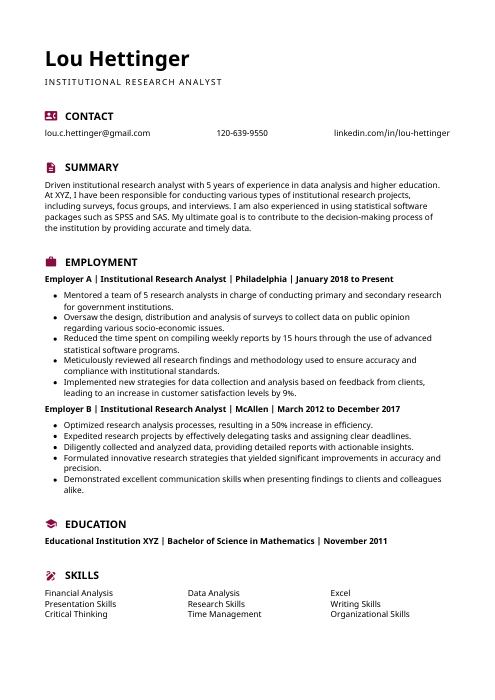 Hoopoe
Hoopoe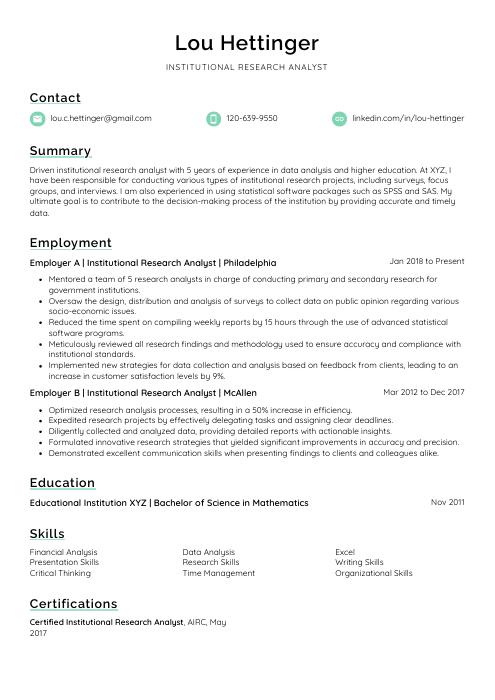 Lorikeet
Lorikeet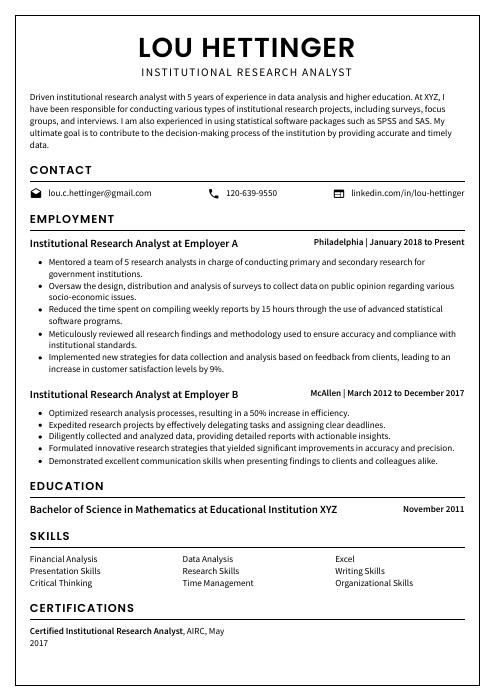 Cormorant
Cormorant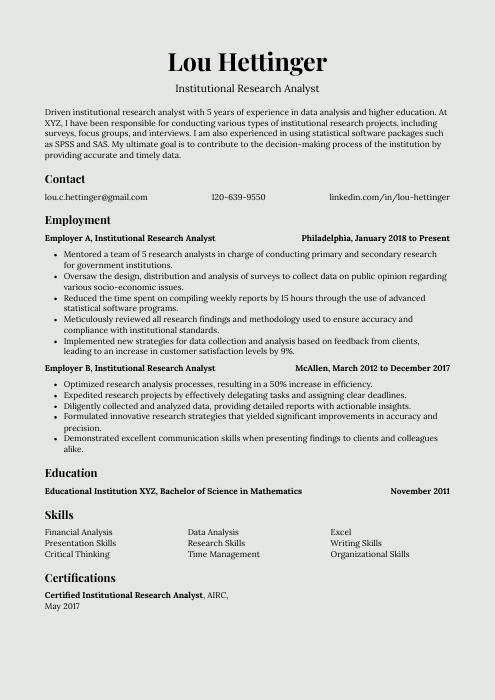 Saola
Saola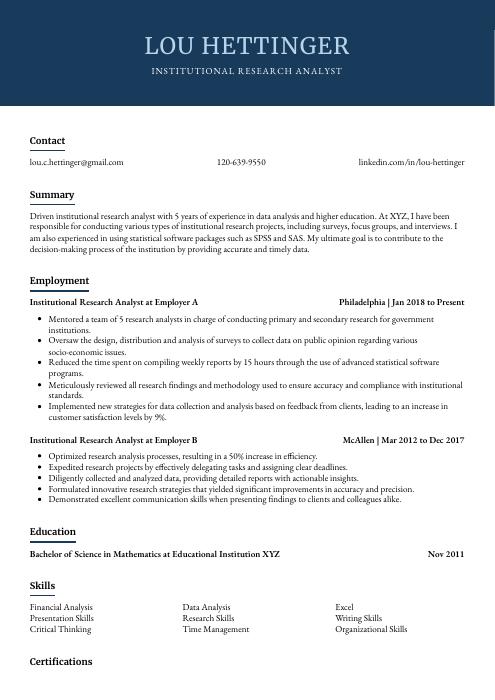 Bonobo
Bonobo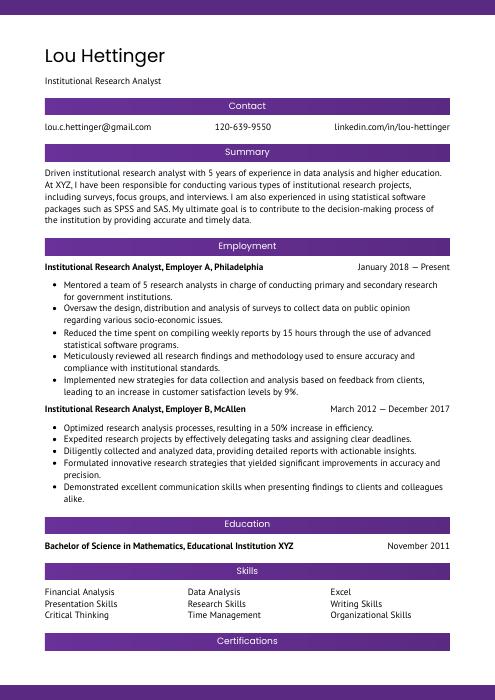 Jerboa
Jerboa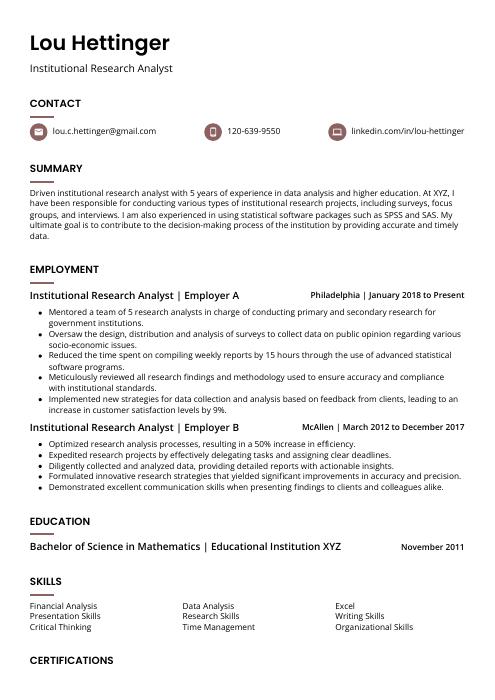 Fossa
Fossa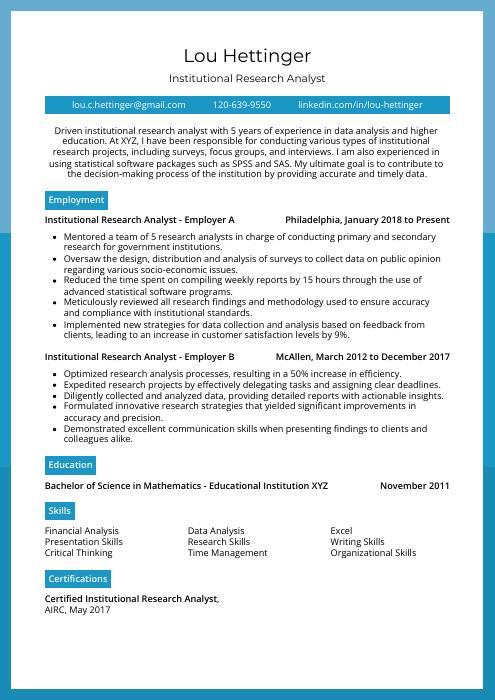 Rhea
Rhea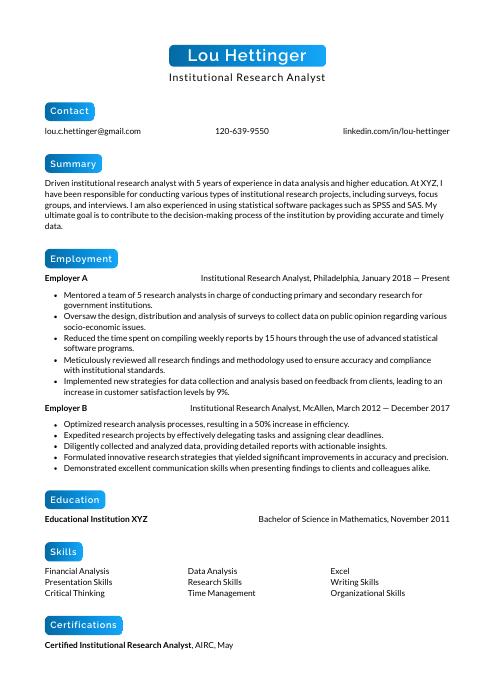 Kinkajou
Kinkajou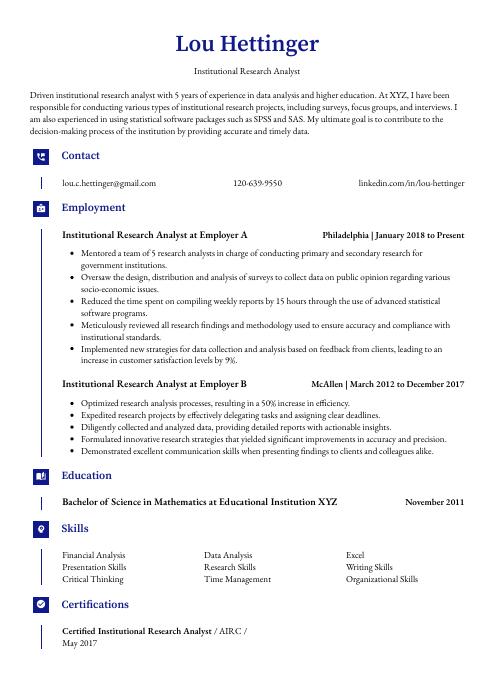 Gharial
Gharial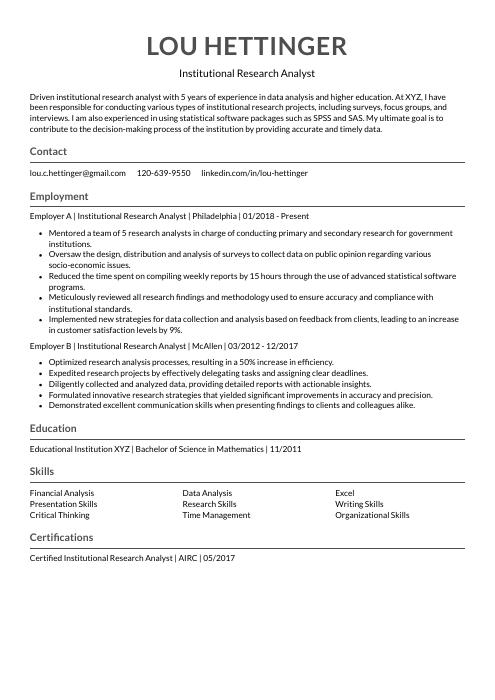 Indri
Indri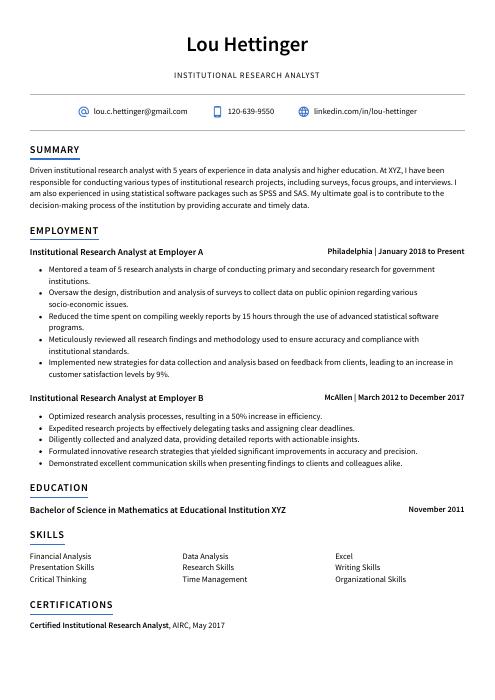 Axolotl
Axolotl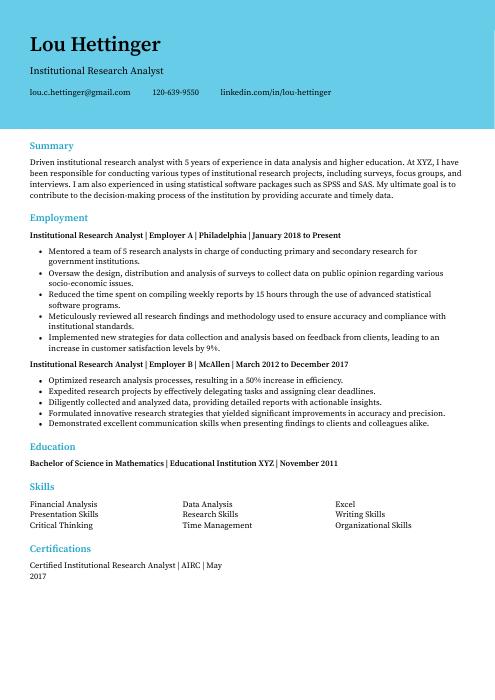 Dugong
Dugong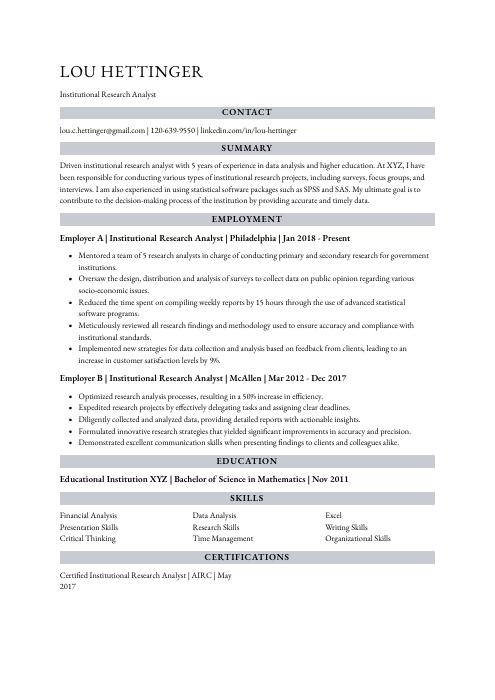 Numbat
Numbat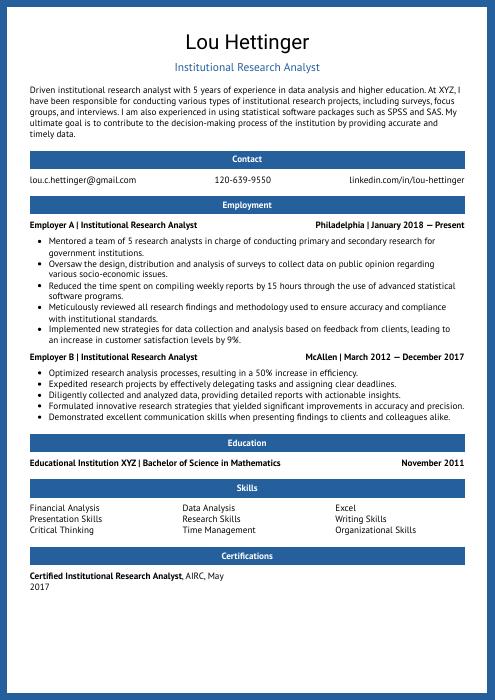 Ocelot
Ocelot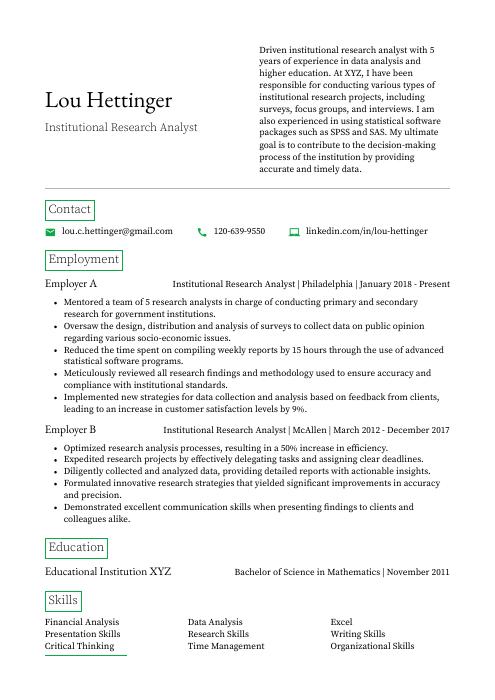 Quokka
Quokka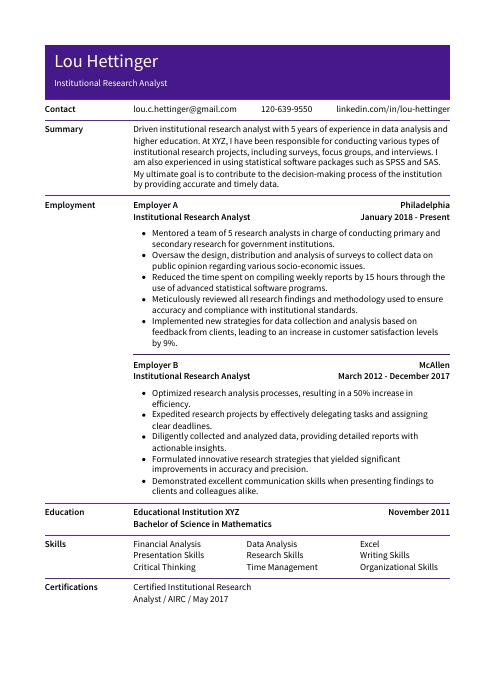 Pika
Pika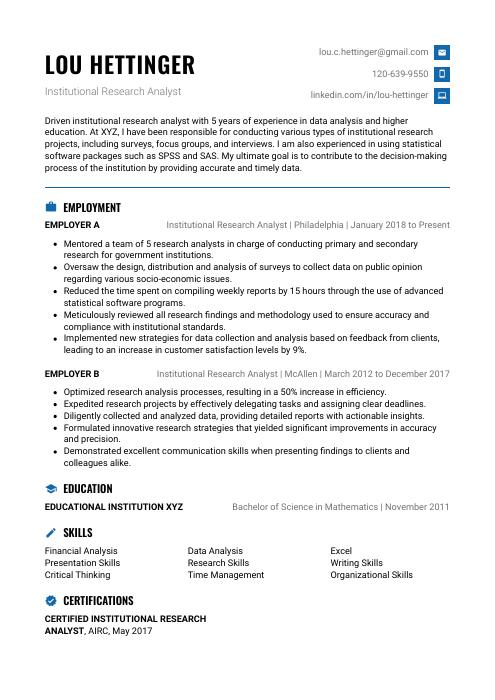 Echidna
Echidna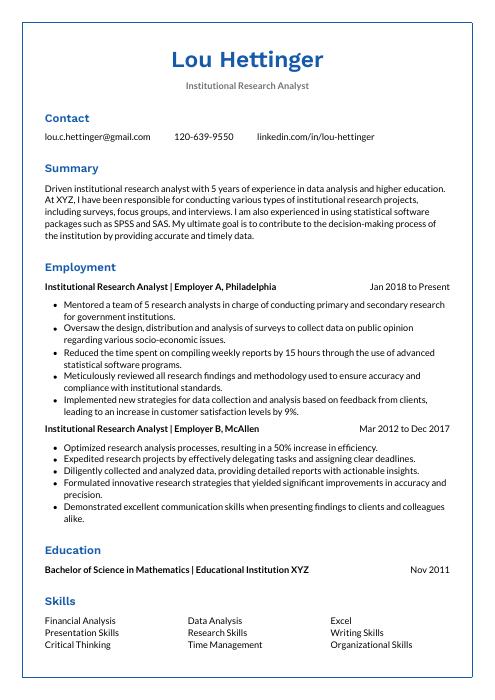 Markhor
Markhor Rezjumei
Rezjumei
